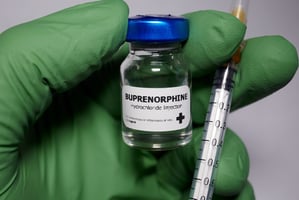Over the past decade, the percentage of students at U.S. college campuses seeking mental health...
MH Symptoms of Survivors of Severe COVID-19 Improve With Follow-Up Care

Veterans who received outpatient care from a clinic that provided psychiatric services after being discharged from the intensive care unit (ICU) for severe COVID-19-related illness showed significant mental health improvements in the months following their discharge. The findings of the small study were published in the May/June issue of the Journal of the Academy of Consultation-Liaison Psychiatry.
More than half of ICU survivors will acquire post-intensive care syndrome (PICS) in the months following hospital discharge, wrote George E. Sayde, M.D., M.P.H., of Tulane University and colleagues. “Within this cohort, the prevalence of posttraumatic stress disorder (PTSD) and depressive symptoms related to the ICU is about 40% and 30%, respectively,” they added.
A PICS outpatient clinic was established in May 2021 within the VA Department of Ambulatory Mental Health in New Orleans, designed to meet the needs of patients who had been hospitalized with critical illnesses related to COVID-19. ICU survivors referred to the PICS clinic received regular multidisciplinary care including psychopharmacology, psychotherapy, case management, and referrals to specialty care, when needed. Patients were screened for symptoms of PTSD, depression, and anxiety at their initial evaluation and then every three months, using the PTSD Checklist (PLC-5), the Patient Health Questionnaire (PHQ-9), and Generalized Anxiety Disorder checklist (GAD-7).
Sayde and colleagues examined data from 77 patients who were identified as high risk of PICS (defined as COVID ICU admission and at least delirium, mechanical ventilation for at least 24 hours, or septic shock); 44 (57%) survived hospitalization. Of the survivors, 21 had at least one follow-up appointment at the PICS clinic.
At the initial evaluation, 66.7% of patients demonstrated clinically meaningful symptoms of PTSD, 38.1% had moderate-to-severe anxiety, and 33.4% had moderate-to-severe depression. At the three-month follow-up, those figures improved: 9.5% of patients still showed significant PTSD symptoms, 4.8% still had moderate-to-severe anxiety, and 4.8% still had moderate-to-severe depression. Additionally, there was a 14.5-point drop in scores for PTSD on the PLC-5 from the initial evaluation to the six-month follow-up.
The authors acknowledged that the small number of patients in the study and the study’s observational nature make it difficult to conclude that the improvement in symptoms is related to care received in the PICS clinic.
“Post-ICU sequelae remain poorly understood, and treatment approaches must be interdisciplinary and individualized,” Sayde and colleagues concluded. “We need more comprehensive, multisite studies that can better characterize patients by their level of risk in developing specific features of PICS to enhance our understanding of post-ICU interventions and improve patient care.”
For related information, see the Psychiatric News article “ICUs Can Result in Long-Lasting Mental Health Problems.”
(Image: iStock/SDI Productions)





